FATHER DE NANTES
Fidei Defensor
FATHER de Nantes is a Catholic priest and theologian who believes that the new “orientations” of the Second Vatican Council (1962-1965), upheld and further developed by Popes Paul VI and John Paul II, have been an unmitigated disaster for the Church. For him the Council and its upholders have demonstrably taught, or at least insinuated, novel and unCatholic beliefs, which have never before been officially maintained in the Church. In fact, such beliefs had been forcefully condemned by previous Popes, right up to Pope Pius XII who died in 1958.
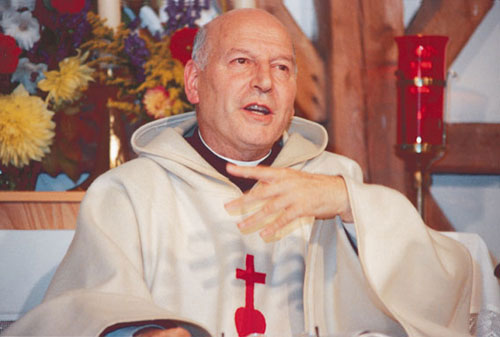
Despite Father’s detailed and well-substantiated criticisms over these last thirty-five years, the authorities in the Church have consistently refused to use their powers to deal objectively with his accusations. Instead of taking up his arguments in their own right (argumentum ad rem), they have preferred to attack his person (argumentum ad hominem). Hence, they have directed their wrath against his alleged subjective attitude, his “tone”, his “contentious spirit”, etc. This was particularly apparent in 1968 when the Congregation for the Doctrine of the Faith examined his complaints against Vatican II and Pope Paul VI. Instead of condemning his alleged “errors”, the Congregation contented itself with stating that he had been disqualified... rather as if he had been a professional sportsman who was not abiding by the rules of the game!
Today Father de Nantes is well-known and even feared in Rome. His three Books of Accusation against Pope Paul VI (1973), against Pope John Paul II (1983), and against the author of the so-called Catechism of the Catholic Church (1993) have proved to be impossible to answer. His accusations are of the most devastating kind imaginable in the Church, involving open charges of heresy, schism, and scandal against the Vicar of Christ on earth. But despite this, he has never been condemned for any kind of error against the Catholic faith and for thirty-five years his doctrinal criticisms have remained without a formal reply from Rome.
EARLY YEARS
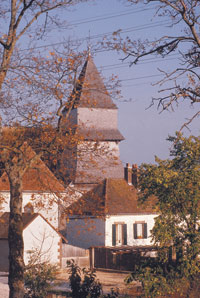 Father Georges de Nantes was born on 3 April 1924 in Toulon (France), the third of five children born to a naval officer. He was ordained priest on March 27, 1948 in Grenoble, the diocese in which he is incardinated. He obtained degrees in theology, scholastic philosophy, and socio-economic science at the Catholic University of Paris, as well as a degree in literature at the Sorbonne. While Professor of Philosophy and then of Theology in various religious and university institutions between 1948 and 1958, he collaborated in several Parisian periodicals of the Catholic and Nationalist Right.
Father Georges de Nantes was born on 3 April 1924 in Toulon (France), the third of five children born to a naval officer. He was ordained priest on March 27, 1948 in Grenoble, the diocese in which he is incardinated. He obtained degrees in theology, scholastic philosophy, and socio-economic science at the Catholic University of Paris, as well as a degree in literature at the Sorbonne. While Professor of Philosophy and then of Theology in various religious and university institutions between 1948 and 1958, he collaborated in several Parisian periodicals of the Catholic and Nationalist Right.
In 1958 the Ordinary of Troyes, Bishop Julien Le Couëdic, admitted him into his diocese for the purpose of founding a community of missionary monks, disciples of Father de Foucauld. There, for five years, he was the country parish priest at Villemaur-sur-Vanne. During this time he formed the Order of the “Little Brothers of the Sacred Heart” and he published monthly letters of spirituality “to my friends” (Lettres à mes amis). In the Letters for 1959 he presented a rigorous theological analysis of the imminent crisis in the Church using terms that could today be called “prophetic”. Then, in 1963, as a result of his firm opposition to the French clergy’s complicity in the abandonment of Algeria to Communist and Islamic terrorists, the Bishop of Troyes deprived him of his parish ministry and all jurisdiction in his diocese.
He and his community submitted to this evident act of injustice and left Villemaur. They now settled in the heart of the Champagne countryside, where they still live today, in the various buildings of Maison Saint-Joseph and Maison Sainte-Marie, in Saint-Parres-lès-Vaudes, Aube.
Vatican II
Around this time, 1963, the community took an increasing interest in the great debates of this turbulent period. Initially they had placed great hopes in the proposed Council of reform. But after the opening speech of Pope John XXIII in October 1962, Father de Nantes was forced to reveal his worst fears. These fears would lead him to an increasing opposition to the drafts and ultimately to the very Acts of the Council. After the publication of the encyclical Ecclesiam Suam by Pope Paul VI in August 1964, he stepped up his opposition and strongly criticised the “cult of man”, ecumenical “dialogue”, and the “reform of the Church” advocated by Paul VI.
Immediately after the close of the Council in December 1965, Father de Nantes pronounced a firm and decisive "Non possumus" against the conciliar novelties. For him they were wholly incompatible with the traditional Catholic faith. He was then threatened with an interdict by the Bishop of Troyes. So he asked to be allowed to appeal to Rome. His aim was to obtain from the Sovereign Pontiff a decisive doctrinal judgement on the legitimacy of his opposition to the wave of conciliar reform and revolution which was sweeping through the Church and carrying all before it. At long last, an agreement was concluded with Bishop Le Couëdic and its terms were officially published in January 1966. Placing his trust in this agreement, he then drew up for the attention of the Pro-Prefect of the Holy Office, Cardinal Ottaviani, the letter that would officially open the process that would examine his works. Bishop Le Couëdic, however, thought this letter was insulting and he refused to forward it to Rome. So Father de Nantes decided to forward it himself and to publish it in his Letters to My Friends. This was the act which earned him the punishment of suspens a divinis in the diocese of Troyes, August 1966. Despite its evident injustice, he submitted to this sanction, not wishing to give any appearance of dissidence, a crime that has always filled him with horror.
THE “TRIAL” AT ROME
However, his request for a trial by Roman tribunal – to determine the orthodoxy of his doctrinal position and his written works – was favourably accepted by the Holy Office (now the Congregation for the Doctrine of the Faith). Father de Nantes was summoned there on two occasions, in April and in July 1968. Ultimately the only accusations retained against him were those of irreverence and disobedience. And for these he was asked to make a general retraction of his criticisms against the Pope and Vatican II. He was also required to make a total and unconditional submission to his bishop and all other ecclesiastical authorities. But as this request was clearly exorbitant and exceeded Church law, he refused to sign the text. Shortly afterwards he received an ultimatum from Cardinal Seper, to which he replied in July 1968 with a “Profession of Catholic Faith”. In this profession, he protests his strict obedience to the Vicar of Christ and the bishops, successors of the Apostles, but within the just limits fixed by the Law.
The Congregation decided not to go ahead with the dogmatic judgement promised in 1966. Instead it concluded the examination of the case with a Notification published in the Osservatore Romano in August 1969. This Notification refers to Father de Nantes’ refusal to retract his so-called “ errors ” – errors which were nowhere explained, and for good reason! – and his refusal to retract his “ grave accusations of heresy against Paul VI and the Council ”. However, no penalty was inflicted upon him, except for the observation that “ in rebelling in this way against the Magisterium and the Catholic hierarchy, Father de Nantes disqualifies (sic) the totality of his writings and activities ”. The sanction of disqualification is one hitherto unknown to canon law. The term is clearly understood in the world of sport, but its use within the context of ecclesiastical discipline is strange and uncertain to say the least.
Curiously, the Documenta 1966-1985, although published in a very official manner by the Congregation, fail to cite for this period the documents relating to this trial, a trial unique in the Church’s history.
GENERAL ACTIVITIES
In October 1967 the bulletin Letters to My Friends was transformed into a periodical with a new title: The Catholic Counter-Reformation in the 20th Century. Its first edition began with an Open Letter to His Holiness Pope Paul VI.
In 1969-70 Father de Nantes founded the “ League of the Catholic Counter-Reformation ”. He precisely defined the nature of its combat which existed on two fronts: that of heresy and that of schism. As well as struggling against theories contesting the validity of the new liturgical and sacramental formulas – theories that lead directly to the rejection of the sacraments and the abandonment of the Church – he undertook at the same time a series of conferences and articles throughout the whole of France, denouncing the new catechisms: the so-called Fonds commun, the Dutch Catechism, Pierres vivantes, and various others...
For 25 years – from November 1972 to the autumn of 1996 when he was forced to stop – he gave monthly conferences at the Mutualité hall in Paris (five hundred seats). In these conferences he dealt with religious and political current affairs. They were followed by courses on theology, philosophy, morality, or the sacred history of France, subsequently published on audio and video cassettes.
BOOKS OF ACCUSATION
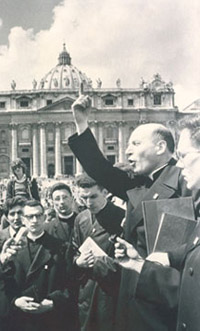 Father de Nantes has always acknowledged the reigning Pope and the bishops in communion with him as the true pastors of the One and Holy Roman Catholic Church. During this period he continued untiringly to appeal to their sovereign authority against the increasingly widespread disorder of ideas and morals. On April 11 1973, accompanied by his brothers and a delegation of the faithful, he went to Rome and presented Pope Paul VI with a book of accusation that requested an infallible judgement from him on his own writings, speeches, and acts. This was the Book of Accusation against Paul VI. But the Pope refused to receive the book and even forbade him access to the Vatican, deploying a barrage of Italian police against him. However, the book was published and translated into several languages. It spread widely amongst the cardinals and the Roman clergy.
Father de Nantes has always acknowledged the reigning Pope and the bishops in communion with him as the true pastors of the One and Holy Roman Catholic Church. During this period he continued untiringly to appeal to their sovereign authority against the increasingly widespread disorder of ideas and morals. On April 11 1973, accompanied by his brothers and a delegation of the faithful, he went to Rome and presented Pope Paul VI with a book of accusation that requested an infallible judgement from him on his own writings, speeches, and acts. This was the Book of Accusation against Paul VI. But the Pope refused to receive the book and even forbade him access to the Vatican, deploying a barrage of Italian police against him. However, the book was published and translated into several languages. It spread widely amongst the cardinals and the Roman clergy.
In 1978, via the generous mediation of Cardinals Marty and Etchegaray, he asked for a “ reconciliation ” with Pope Paul VI, who had recovered from many of his illusions and who was deeply upset by the level of insubordination and treachery, which he discovered amongst even his own retinue. In June 1978 an encouraging meeting took place at Paris with the two cardinals; and they agreed to transmit his request to Rome. But at this moment the Pope passed away and the thread of the negotiation was lost.
After the immense hope aroused by the pontificate of John Paul I, John Paul II was elected to the papacy. The Congregation for the Doctrine of the Faith now asked Father de Nantes to clarify the aim of his request for a reconciliation. He did this, in March 1979, in a Letter to the Prefect of the Dicastery, Cardinal Seper. Alas, in January 1982, the Apostolic Nunciature to Paris will send him a negative answer, basing their argument on the unacceptable “ tone ” of the recent editions of the bulletin of the Catholic Counter-Reformation.
For Father de Nantes and his followers, it was quite obvious in 1980 that the much-desired renaissance of the Roman Church was conclusively compromised by the new Pope. He was committed to the same tortuous paths that Paul VI had marked out, all in the name of the Reform: ecumenism, the rights of man, and religious liberty. And so, in May 1983, Father de Nantes returned to Rome – accompanied this time by two hundred and fifty people – to present the Pope with his Second Book of Accusation. The Secretary of the Congregation, Bishop Hamer, refused to accept it and published a Notification in the Osservatore Romano in which he confirmed his rejection of the Book, “ because it is not possible to accept accusations that are unjustified and gravely offensive to the Holy Father ”.
In 1985 Father de Nantes addressed an “ Entreaty for the Peace of the Church to our Holy Father the Pope and to the bishops gathered in synod for the 20th anniversary of the Second Vatican Council ”. It also remained unanswered, although it was received and studied in secret by a number of cardinals and bishops.
In May 1993 he took to Rome a Third Book of Accusation, this time against the Author of the Catechism of the Catholic Church. In this he denounced the major heresies proliferating in this text. This time the document – supported by a group of two hundred and sixty-seven co-signatories – was officially received by the Congregation, but absolutely no proceedings ensued.
A TEMPORARY STATUS QUO
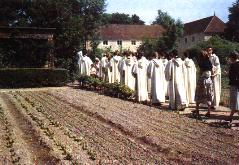 Throughout this period successive bishops in the diocese of Troyes observed a sort of status quo with regard to Father de Nantes and his community. They expected that Rome would eventually deal with the doctrinal questions at issue in a decisive and definitive manner. Without showing any undue harshness, they maintained the suspension decreed by Bishop Le Couëdic in 1966 – although this suspension had virtually been extended to the whole of France after the Bishop of Grenoble, the diocese of his incardination, had refused to renew his celebret.
Throughout this period successive bishops in the diocese of Troyes observed a sort of status quo with regard to Father de Nantes and his community. They expected that Rome would eventually deal with the doctrinal questions at issue in a decisive and definitive manner. Without showing any undue harshness, they maintained the suspension decreed by Bishop Le Couëdic in 1966 – although this suspension had virtually been extended to the whole of France after the Bishop of Grenoble, the diocese of his incardination, had refused to renew his celebret.
For thirty-five years Father de Nantes’ position has not changed. His opposition to the novelties and distortions of the so-called reform of the Church decreed by Vatican II is an opposition that is firstly a priori and dogmatic – relating to the texts themselves – and secondly a posteriori and pastoral – based on the observation of the detestable results of these novelties. He pursues his work, surrounded by the Little Brothers and the Little Sisters of the Sacred Heart and by a third order founded in 1984, the Phalangist Communion. Having retired into his community, he celebrates Holy Mass for his immediate circle, but out of obedience he no longer exercise his other powers, including that of hearing confessions. Along with his religious brothers, he continues his scientific, theological, and historical studies. He gives conferences and retreats, and the Catholic Counter-Reformation printing press periodically publishes works that carry authority in a number of domains, particularly studies on the Church crisis, the defence of the Holy Shroud’s authenticity, the message of Our Lady of Fatima, the facts about Medjugorje, the scientific translation of the Koran, the life of the saints, and studies in French history, among others.
The Catholic Counter-Reformation is opposed to the sedevacantists and the Lefebvrists on the one hand and the various Conciliar trends – progressive and conservative – on the other hand. It is a school of thought and a youth movement, whose numerous intellectual labours, congresses, retreat-camps, and conferences maintain a high level of faith and honest religious practice. It keeps thousands of traditional Catholics in proper obedience to the Catholic hierarchy in the affairs both of the parish and the school, and these Catholics manifest a complete and sincere recognition of the legitimacy and the sovereignty of the reigning Pope and of the world-wide episcopate in communion with him.
THE LATEST CONTROVERSY
The controversy, which is now before the Supreme Tribunal of the Apostolic Signatura, sometimes called “ the tribunal of the Pope ”, began in July 1996 when Bishop Daucourt, having governed the diocese of Troyes for five years, published a warning against Father de Nantes and his communities. This “ declaration ” repeated accusations that are clearly defamatory. No canonical enquiry had taken place and the “ accused ” had not even been admonished or summoned to present his defence. The bishop’s office took pains to distribute this document widely, both in France and abroad.
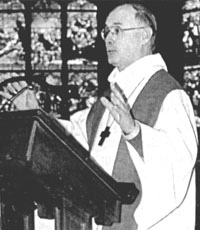 It was only after the publication of such a warning – immediately broadcast by the local press and La Croix – that the “ accused ” received a letter addressed to him personally from Bishop Daucourt. This was then followed up by an interview at the bishop’s palace on 1 August 1996. Without any legal reasons, Father de Nantes was ordered to leave Maison Saint-Joseph at the earliest opportunity and to retire permanently to a monastery. He was to have no communication with his brothers and his friends. If this order were not executed punctiliously, he was told he could expect the inevitable eruption of a media scandal.
It was only after the publication of such a warning – immediately broadcast by the local press and La Croix – that the “ accused ” received a letter addressed to him personally from Bishop Daucourt. This was then followed up by an interview at the bishop’s palace on 1 August 1996. Without any legal reasons, Father de Nantes was ordered to leave Maison Saint-Joseph at the earliest opportunity and to retire permanently to a monastery. He was to have no communication with his brothers and his friends. If this order were not executed punctiliously, he was told he could expect the inevitable eruption of a media scandal.
As there was no question of an issue relating to the faith, Father de Nantes submitted to this decision, despite its evident precipitation and fundamental injustice. His main concern was to avoid bringing another bitter wound on Holy Church, already so embroiled in various scandals. So, on August 7, he set off. Initially he went to a rigorously cloistered monastery, but as he was not permitted to stay there long, Bishop Daucourt had to intervene and secure a more permanent place for him in the abbey of Hauterive, in the diocese of Fribourg (Switzerland), where he was received in September with the greatest charity.
Father de Nantes spent a little over three months incognito in the solitude of this abbey. During this time his brothers and the sisters of the community received the sacraments in the various parishes and churches in the diocese of Troyes. But suddenly circumstances changed radically; the community received a letter from Bishop Daucourt insisting that they receive a visitor who would arrange for the community to have “ canonical status, a legitimate superior, and a chaplain ”. These demands, as well as other related events, appeared to anticipate a demand on them to comply with the doctrinal and pastoral novelties of Vatican II. For this reason the senior brothers urged Father de Nantes to come back to them and resume his responsibilities as founder and prior of the community, which he did in January 1997.
On his return Father de Nantes’ received two letters from Bishop Daucourt in March 1997, and there was a new public declaration from the Bishop on 6 March. These documents all repeated the same accusations of July 1996, again without any enquiry having been set up. However, the principal charge took the conflict back to its essential object which was doctrinal. The Bishop told Father de Nantes that he had to retract his accusations against Vatican II and against the Popes Paul VI and John Paul II. He was threatened with an interdict based on canon 1371 of the Code of Canon Law.
This time Father de Nantes decided that there was no moral obligation for him to submit immediately to his Bishop, since he had the right to defend himself against an act of apparently unjust ecclesiastical authority – a right that every Catholic has in Canon Law. He replied with a detailed defence on March 25, in which he refuted point by point the imputations cast by the Bishop, denouncing the illegal and arbitrary procedures employed, and declaring that in conscience he was unable to comply with the monition raised against him, since he had always affirmed and defended his right and his duty to uphold these accusations for the salvation of souls and for the good of the entire Church.Bishop Daucourt insisted and on 9 May 1997 he despatched a penal Precept against him, stating that he must: cease his accusations of heresy against Vatican II and the Pope; stop “ inciting the laity against the Holy See ”; put an end to the bulletin The Catholic Counter-Reformation in the 20th Century; depart for ever from the communities he had founded; and observe the suspens a divinis imposed on him in 1966. Failure to comply would lead to his being barred access to the sacraments of Penance and the Eucharist. After Father had announced his intention to appeal to Rome against this exorbitant demand, in accordance with his rights enshrined in Canon Law, the Bishop followed his Precept up with a Decree on July 1, 1997, which sought to put into effect the sanctions threatened in the Precept, despite the fact that, according to Canon Law, Father de Nantes’s appeal to Rome had now introduced a suspensive effect ipso iure into the Bishop’s disciplinary process against him, thus rendering this further action uncanonical.
In appealing to the Congregation for the Doctrine of the Faith against his Bishop’s sanction, Father de Nantes was asking for both of these actions to be revoked, arguing that they were unfounded, illegal, and above all – given the the scope and the doctrinal nature of his criticisms – wholly outside the juridical competence of the Bishop.
Sadly, however, even the Congregation for the Doctrine of the Faith continued to evade its responsibilities in this case, as is all too apparent when one reads the letter sent by its representative, Archbishop Bertone, to Bishop Daucourt on 24 March 1998. Although (interestingly) it omitted to confirm the Bishop’s interdict, it rejected Father de Nantes’ appeal out of hand and confirmed his suspension a divinis for an indeterminate period of time. Regrettably, it also manifested some rather uncharacteristic credulity concerning certain calumnious claims made about Father’s mystical beliefs and his personal conduct.
Given this series of flagrant illegalities, culminating in the wholly inadequate and dismissive note of the Congregation for the Doctrine of the Faith, Father de Nantes had no other recourse than to the Supreme Tribunal of the Apostolic Signatura, the “ tribunal of the Pope ”, the highest court in the Church, charged with watching over the proper administration of justice. To this end, he drew up in the following month (May 1998) a twofold complaint, firstly against Bishop Daucourt for his blindly imposed sanctions, and secondly against the Holy Office for its unreasonable refusal to examine his two appeals against the present-day partisans of error. Due to its confidential nature, this text has not been made public.
Bishop Daucourt was transferred to the diocese of Orleans in 1998, and a new ordinary, Bishop Marc Stenger, was appointed to the See of Troyes on September 5 1999.
Brocard Sewell, o.c.d. Lodestar n° 5, 1987 (updated to 1999)